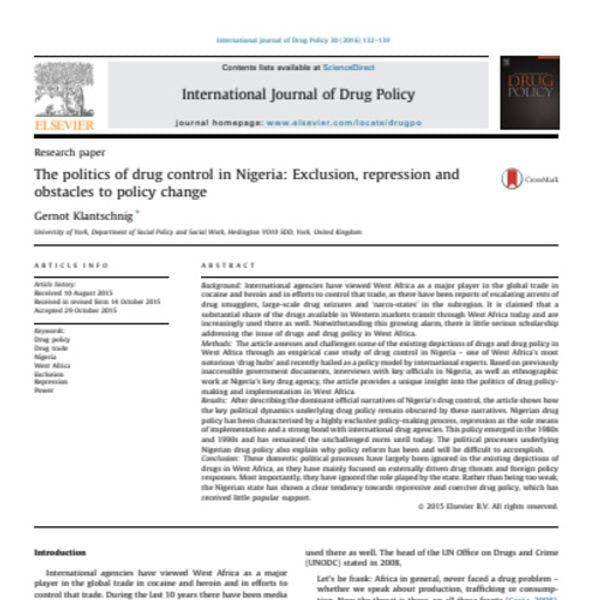The politics of drug control in Nigeria: Exclusion, repression and obstacles to policy change
By Gernot Klantschnig
International agencies have viewed West Africa as a major player in the global trade in cocaine and heroin and in efforts to control that trade. During the last 10 years there have been media and official reports of escalating arrests of West African drug smugglers, large-scale seizures and concerns about narco-states in the subregion (El Pais, 2009; New York Times, 2010; Observer, 2008; UNODC, 2008). It has been claimed that after decades of the subregion’s insignificant role in the global trade and its control, a substantial share of the drugs available in Western consumer markets transit through West Africa today and are increasingly used there as well. The head of the UN Office on Drugs and Crime (UNODC) stated in 2008.
Let’s be frank: Africa in general, never faced a drug problem – whether we speak about production, trafficking or consumption. Now the threat is there, on all these fronts (Costa, 2008).
By the end of the decade, increasing concern led to depictions of WestAfrica as the ‘coke coast’ andstates suchasGuinea-Bissaucame to be labelled as ‘narco-states’, collapsing under the ‘invisible tide’ of drug trafficking and use (Cockayne & Williams, 2009; ICG, 2008; Vernaschi, 2010). International experts were certain aboutthe evergrowing magnitude of West Africa’s role in the international drug trade. The head ofthe UNODC argued, ‘I haveno doubt we’re going to see production [of cocaine]’ (Costa cited in Kirschke, 2008). Such dramatic claims about West Africa’s drug markets – many of them based on little evidence – have helped to attract public and donor attention to Africa’s drug problems. However, they have also hindered a better understanding of drug trends and policies in the subregion, as they describe West Africa’s drug problems as largely driven by external factors and states in the subregion as too weak, porous and unprepared to withstand this external threat (Cockayne & Williams, 2009; ICG, 2008; UNODC, 2008; Vernaschi, 2010). This article assesses and challenges some of these depictions with a case study of the recent history of drug control in Nigeria – one of West Africa’s most notorious ‘drug hubs’ that attracted attention long before the current concerns with cocaine trafficking in the subregion and a country now hailed as a drug policy model by international experts. In contrast to media and official depictions and by building on the limited drug policy research available on Africa (Bernstein, 1999; Klein, 1999; Obot, 2004), it aims to provide a rare empirically based analysis of the drug policy making and implementation process in West Africa.
The article begins by reconstructing dominant narratives of Nigeria’s drug control, while the subsequent parts assess the political dynamics hidden by these narratives, drawing on an historically grounded and constructivist approach to analysing policy. First, rather than simply being driven by drug-related trends, drug control followed a broader institutional process of exclusion, typical under periods of military rule in West Africa and continuing into democratic Nigeria after 1999. Second and linked to this process, the Nigerian state – rather than being too ‘weak’ to react – showed a strong preference for repressive drug control sidelining the policy alternatives propagated by health officials. Finally, Nigerian drug officials, particularly in the National Drug Law Enforcement Agency (NDLEA), have also begun to externalise their domestic political conflicts over resources and ideas in the last 15 years by drawing in international drug agencies – mostly as a means to prevent policy change and reform. In essence, drug control over the last 25 years has been driven more by concerns over state power rather than Nigeria’s drug problems – evidence of which has been sparse since the country’s earliest drug policies.
Keep up-to-date with drug policy developments by subscribing to the IDPC Monthly Alert.
Downloads
Topics
Regions
Related Profiles
- International Journal of Drug Policy
